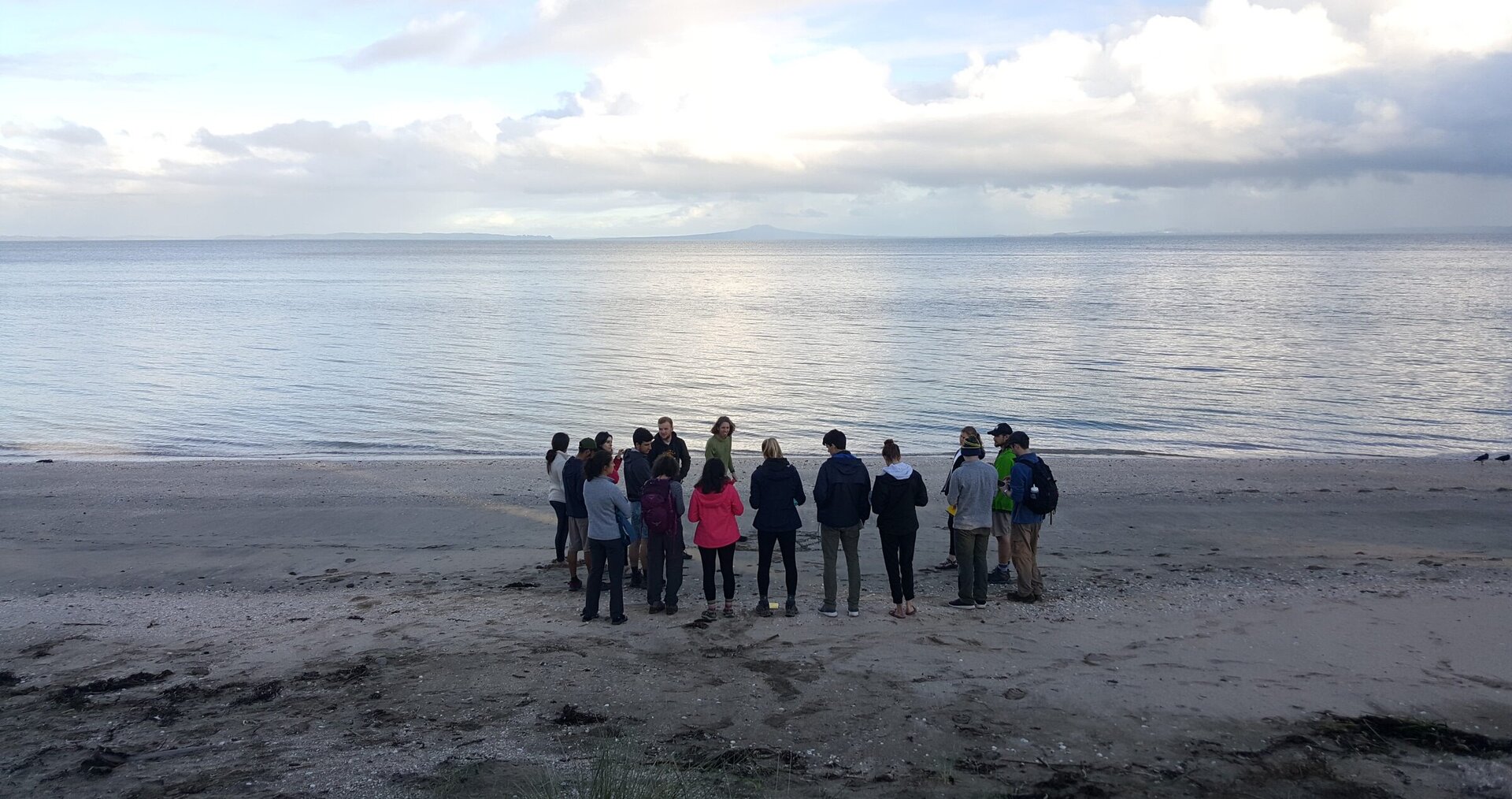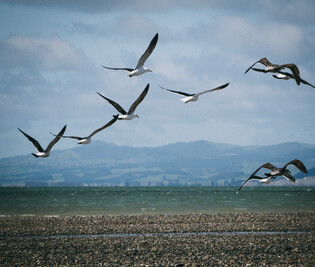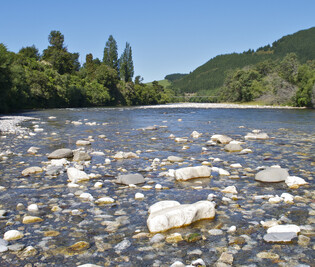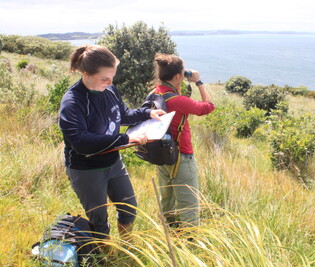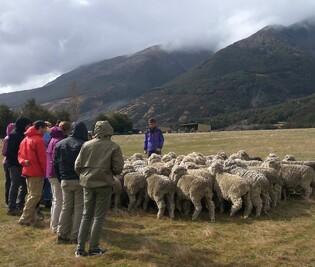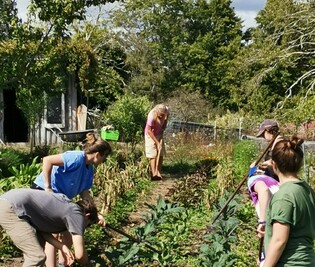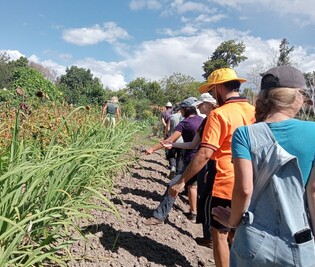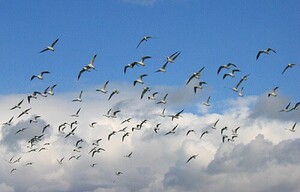Academic Program Information for Advisors
EcoQuest offers three residential, applied field studies programs. All programs are accredited by the University of New Hampshire and open to highly motivated students from colleges and universities world-wide. Students are registered for academic credit at UNH. Upon successful completion of the program, this credit may be transferred directly to the participants home institution.
Program | Courses | Weeks | Courses | Credits |
|---|---|---|---|---|
Ecology in Action - Fall & Spring Semester | NR660, 661, 662, 663 | 15 | 4 | 16 |
Ecology in Action - Summer | NR660, 662 | 5 | 2 | 8 |
Sustainable Agriculture & Food Systems Aotearoa | SAFS670, 671, 672, 673 | 15 | 4 | 16 |
Course Descriptions
Why Study in New Zealand
Aotearoa New Zealand is a young, dynamic country in every sense of the word: geologically young, as well as young in its people-history, and is characterised by a lively and forward-looking cultural, social and political scene.
Pedagogy
EcoQuest provides an exciting mix of academic rigour and place-based, hands-on learning. We foster intellectual curiosity and critical thinking. Students at EcoQuest learn by doing in an interdisciplinary setting, in which they develop transferable field skills, pro-active problem-solving skills and collaborative approaches. As part of our programs, students have the chance to learn in and about terrestrial, coastal, and island ecosystems.
In addition to working closely with the regular EcoQuest faculty and staff, students benefit from the expertise of a wide range of people throughout Aotearoa New Zealand. The list of guest lecturers and contributors to the EcoQuest programs includes faculty of New Zealand universities, scientists from Crown Research Institutes, people who work in non-government organizations, landowners, environmental and resource management consultants, community leaders, and local and regional councillors and politicians. All contributors to the programs are selected for their expertise and experience as well as their ability to be solid role models.
Students are always welcomed onto the local Wharekawa Marae. Basic skills in Te Reo Māori (Māori language), kawa and tikanga (protocol), as well as developing a solid understanding of the Treaty of Waitangi are integral components of all EcoQuest programs. This enables students to participate in all parts of life in New Zealand, and explore aspects of Māori culture, history and traditions, as well as issues related to customary use, traditional knowledge, ownership and kaitiakitanga (guardianship) of resources. We aim to have at least one stay of multiple days on a marae during all programs.
Alongside the necessary general theory and background information, we choose topical issues and case studies as foils for applied learning. The two courses that make up the summer program are comprised of lectures, interactive workshops, and field exercises. Field exercises are an integral part of the EcoQuest program. These exercises (up to 6 in the summer program), are designed for students to engage with topical case studies, learn about planning and carrying out field investigations, processing data, presenting findings, and investigate multiple facets of complex management dilemmas. Rigour, teamwork and peer teaching are important in all the field exercises.
EcoQuest programs are academically rigorous and challenging – both mentally and physically. Students need to demonstrate high levels of motivation, intellectual curiosity, stamina, physical fitness and resilience. Highly skilled academic staff and field leaders accompany and guide students during all field exercises and Directed Research Projects. The well-qualified and dedicated faculty and staff help to make programs at EcoQuest a great learning experience.
The high ratio of staff to students at EcoQuest aims to ensure quality program delivery. EcoQuest provides all necessary physical resources to enable students to fully partake in the programs, including all program-related transport within New Zealand. Qualified field staff provides skills-training for activities that are necessary to participate in the programs (e.g. use of map & compass, GPS, specific skills needed for the use of field equipment). All skills-training is provided in accordance with Risk Management Standard Operating Procedures. Staff reviews learning materials and learning experiences with the students on a regular basis, to make sure that the relevance of materials in the context of the program is understood.
Requirements for Admission
The EcoQuest program is committed to providing a learning environment that offers mentorship, empowers students, encourages self-directed learning and enables students to succeed. The most important selection criteria for EcoQuest participants are intellectual curiosity, motivation, a willingness to be engaged and to be challenged, and a commitment to become a positive and supportive team member. We invite applications from forward-thinking students who have already embarked on their personal journey to gain an understanding of sustainability and to acquire practical skills and tools that enable participation in research and resource management processes anywhere on the globe.
EcoQuest-UNH programs are founded on interdisciplinary learning. There is a lot of emphasis on how to achieve effective communication among different cultures, interest groups, scientists and stakeholder organisations in order to investigate and develop paradigms for a sustainable world.
Program content will build on many ideas and questions that students may have formulated as part of their prior learning. We will take students away from the walls of conventional learning institutions. These are programs for open-minded, conceptual thinkers. During their stay in New Zealand students will be challenged to combine existing knowledge and awareness with new experiences and concepts through involvement in real-world issues and problem solving.
Programs are academically rigorous, and may be physically challenging. Students need to demonstrate a moderate to high level of physical fitness, and importantly, stamina and resilience.
We encourage a diversity of origins, backgrounds and viewpoints among our students to make the most of our vibrant and dynamic learning community. Download brochure
General Prerequisites
All Programs: Agreement with the fundamental principles of intensive study, group cooperation, conservation ethic, and personal responsibility that are central to the EcoQuest living and learning environment.
Ecology in Action Programs: Successful completion of at least 48 semester credit hours (or equivalent) of college or university studies, including at least one semester course in the natural sciences (biology, chemistry, earth sciences, physics) and one in the social sciences (anthropology, economics, geography, political science, sociology).
A moderately high degree of physical fitness, including the ability to swim competently (semester programs only), to participate in the occasional overnight hike, and to work outside for extended periods in all weather.
Sustainable Agriculture and Food Systems Aotearoa: Successful completion of at least 36 semester credit hours (or equivalent) of college or university studies, including at least one semester course related to agriculture production and management (such as Sustainable Agriculture, Horticulture, Animal Science, Agroecology, or equivalent courses), and at least one related to Agricultural Business, Environmental Economics, or Food and Society.
A moderately high degree of physical fitness, including the ability to work outside for extended periods in all weather.
Please note: Non-native speakers of English must demonstrate competency in English in an interview situation.
Course Descriptions
NR660: Ecology and Biogeography of New Zealand
5 Credit Hours. Permission, Junior Standing. (Coreq: NR661, NR662, NR663)
Course Description
From a bioregional perspective, students learn about the geographical, geological, biological, and human ecological processes that have shaped the distribution of species and biotic communities in present day Aotearoa New Zealand. The course emphasizes interactions and interdependencies among marine, freshwater and terrestrial ecosystems.
Students will
- gain a fundamental understanding of specific attributes of New Zealand’s insular evolutionary history, its diverse landscapes and unique biota, and the impacts of recent human habitations.
- develop field skills (classification, mapping, habitat assessment, field identification, sampling) as they study community ecology of representative ecosystems and the effects of human influences on these systems.
- identify and understand inter-relationships of important taxonomic groups, map and quantify habitats and species-habitat relationships, assess impacts of gradients on patterns of species abundance and distribution, and track the effects of exotic species on native ecosystems.
This course, along with NR661 and NR662, is taught through integrated modules of lectures and field exercises.
Learning outcomes
A basic understanding of representative New Zealand ecosystems and how they function;
- An awareness of the impacts of some human activities on native ecosystems;
- Acquisition of field identification skills (focusing on key species), and learning to apply these in assessment of the relative quality of key habitats;
- A specific understanding of drivers, food webs and life cycles of key ecosystems through case studies: coastal/marine, estuary/saltmarsh, freshwater, native/exotic forest, agricultural, sub-alpine;
- Development of biodiversity awareness and assessment skills;
- Development and application of skills needed to conduct basic research and monitoring, including observational and sampling techniques, and a solid working knowledge of appropriate field practice/procedures.
NR661: Restoration Ecology and Ecosystem Management in New Zealand
4 Credit Hours. Permission, Junior Standing. (Coreq: NR660, NR662, NR663)
Course Description
Examination of ecological opportunities and constraints to be considered to ensure sustainable use of the natural resources in and around the Hauraki Gulf and the Hauraki / Coromandel / catchment (watershed). Students will investigate resource planning and management in this ecosystem. In addition, they will have the opportunity to study the coastal ecology of Kaikōura, and native forests and sub-alpine ecology in the Central and West Coast regions of the South Island. We examine the impacts of resource management on natural and human communities, conflicts among various user groups and systems for their resolution. Particular emphasis will be placed on the management of forests, agricultural lands, near-shore marine areas, the coastal zone, and special wildlife management areas. Aesthetic, ethical and economic implications of various management strategies will be examined and debated, with participation by representatives of key resource management agencies and interest groups.
Learning outcomes
- A basic understanding of the functioning of some representative and vital ecosystems, ranging from only slightly altered, to severely modified ones;
- An appreciation of the ways in which good baseline scientific research and regular monitoring of critical physical, chemical and biological forces can be effectively used in the development and operation of sound resource management practices;
- An awareness of the public structures and interest groups involved in today’s overall resource management system in New Zealand: the roles and responsibilities of each, and how they interact;
- Experience of working in the field with Māori cultural & conservation groups, and gaining an understanding of the spiritual/cultural values and philosophies behind traditional approaches to resource management;
- A clear understanding of Marine Reserves, Environmental Indicators (EI) Protected Natural Areas (PNA), and Biodiversity Strategies and how they are likely to influence resource management actions in New Zealand in the future;
- Development of field practice skills (design of efficient work plans, sampling techniques, appropriate data analysis and effective team management).
NR662: Environmental Policy, Planning and Sustainability in New Zealand
3 Credit Hours. Permission, Junior Standing. (Coreq: NR660, NR661, NR 663)
Course Description
In this course, students will assess the impacts of the Resource Management Act (1991) (RMA) on the ecology, economy, and socio-political environment in New Zealand. We examine issues related to the historical exploitation of New Zealand’s resources, indigenous use issues and conflicts, new threats posed by modern society, and the ways in which New Zealand and the world can move toward a sustainable equilibrium between people and nature. We will look at the factors that have historically determined the quality of New Zealand’s natural environments (low human population density, primary producer economy, relatively enlightened social policies, traditional culture, etc.). Speakers may be from industry (business, agriculture, fisheries, forestry, and manufacturing), Department of Conservation (DoC), the Auckland, Waikato and Canterbury Regional Councils, some district councils, Iwi (Māori) representatives and others from diverse economic, social and cultural backgrounds. Resource consent processes at district, regional and national levels will be studied on a case by case basis and appraised in terms of their relative economic and social costs and their effectiveness in settling issues and achieving sustainability. Various New Zealand administrative/political structures such as the Ministry for the Environment, DoC, local authorities, Crown Research Institutes, and Treaty of Waitangi Fisheries Commission will be evaluated for their effectiveness in dealing with key issues, including the philosophical and ethical context related to national and global environmental policy and action. Students will be challenged to consider multi-disciplinary, consensus-building and practical plans of action for the development and maintenance of policies that are, at once, economically, socially and environmentally sustainable.
Learning outcomes
- A basic understanding of how environmental policy is formulated and carried out at different levels of government, and of the principal influences that cause it to change over time;
- Development of the students’ conceptual thinking abilities in appreciating the complex global interrelationships among the multiple forces of the natural world, and the different ways that human cultures and governments deal with these in terms of real and perceived requirements of people and countries;
- Sharpening of abilities to seek out and understand all of the variables and differing points of view that are behind every question of development vs. conservation;
- Understanding different policy stances (comparisons of countries, cultures, economic theories) and what drives them;
- Developing a mind-set of consultation and problem solving based on the use of all available information concerning the target issue;
- An appreciation for the basis of traditional land ownership systems, and concerns by Māori (and other native peoples outside New Zealand) regarding modern approaches to land use.
NR663: Applied Directed Research in New Zealand
4 Credit Hours. Permission, Junior Standing. (Coreq: NR660, NR661, NR662)
Course Description
Students learn to use the scientific method to (design and) carry out research projects relating to resource issues in the greater Hauraki basin. They master the elements of experimental design, develop working hypotheses, use standardised methods for data collection and basic statistical and/or policy analysis to create a scientific report on a resource issue of concern. Students will work closely with faculty on project selection, implementation and write-up. Data analysis and communication, including writing skills, will be stressed. Students will critique published scientific papers. Upon completion of the project, the students will present their findings at a seminar, which includes our collaborative research and resource management partners, community-interest groups, interested individuals and clients. Students who work closely with government agencies or private sector scientists will present their findings to the relevant organizations. All projects undertaken by EcoQuest students have scientific and societal relevance. NR663 is listed as writing intensive at UNH.
Learning outcomes
- Development of practical research skills, from experimental design through to analysis of results and presentation of findings; increasing confidence through working in a team and being personally responsible for the achievement of a significant (field) research project.
- Improved skills in scientific writing
- Improved skills in presentation of findings and public speakin
Directed Research Projects
Directed Research Projects facilitated by EcoQuest are comprehensive field-based studies that equip students with the knowledge and skills required to become effective, modern researchers. Our projects provide students with an opportunity to take charge of research that is relevant, topical and in many cases seminal, in understanding the unique biotic and abiotic processes that shape our environment and all life in New Zealand. From beginning to end, these projects provide a thorough academic experience for students. Transferable skills taught include effective analysis and synthesis of published literature, development and application of research questions, implementing research strategies in the field, as well as analysing and interpreting results and communicating them to an audience in an academic setting.
Although highly significant in their own right, Directed Research Projects carried out by students frequently serve as catalysts for an array of research avenues focussed around conservation, ecology, sustainability, society and policy on both a local and national level. To date, projects carried out by students at EcoQuest have contributed enormously to scientific research in New Zealand, and with each passing semester continually deliver in this regard.
Students and staff work together in small teams (4-6). Each team has an academic supervisor (EcoQuest faculty) and field staff dedicated to the project, ensuring quality work is achieved at every step. Students are involved in every step of the scientific process and are responsible for field work, data collection using standardised techniques, and scientific writing (all students produce an in-depth research report). For many students, this is their first chance to get ongoing feedback on a substantial piece of written work. The end-result is a report prepared to a very high standard, of which both students and faculty can be proud.
Working in small teams enables students to carry out field work that would be impossible to complete individually. The projects generate large datasets, teaching the students complex organization skills. Many of the projects are longitudinal research efforts, providing the students with the opportunity to compare their findings to surveys conducted over many years. Students contribute to long-term datasets, which are rare and highly valued in ecology.
Students engage with projects benefiting the environment, stakeholders, and the local community. They give back something valuable to their host country and local organisations they have worked with: All teams present their findings in a seminar. The audience for these presentations typically include faculty and peers from EcoQuest, stakeholders of the projects, members of the local community and local iwi (tribes), EcoQuest research associates, faculty from local universities, scientists, local authority representatives, land managers and conservation managers (from government departments, regional councils, district councils). The seminar-day can be held at EcoQuest, at Wharekawa Marae, or occasionally further afield when hosted by other institutions or organisations.
We aim to find a best-fit (students and research projects), and to meet the students’ individual preferences. We offer a selection of projects each semester. Some research activities are strictly seasonal, and some long-term projects may at times be a priority.
SAFS670 Systems Thinking: Land Use Capability and Sustainability
4 Credit Hours. Permission (Coreq: SAFS671, SAFS672, SAFS673)
Course Description
This course establishes a conceptual framework (lens) in systems thinking to critically examine New Zealand and global examples of the challenges that have arisen from the mismatch between land use and land use capability. Students investigate downstream effects of the rural-urban divide (food-justice), on people, health, services and the environment. Food security, ethical foods, as well as the influence of climate change on food supply and the viability of agribusiness are included.
Course Goals Include
Using systems thinking to enable students to access and apply the information and conceptual tools available for a robust and defensible analysis of agricultural sustainability problems and causes.
Learning outcomes
- Identify individual elements of an agricultural system
- Describe the dimensions of sustainability and examine the definitions of ‘sustainable land use’ and ‘land use capability’.
- Explain links and interactions between elements that comprise the whole of an agricultural system.
- Illustrate how Treaty Settlements have enhanced or hindered the iwi economy (tribal, Māori economy) in the agricultural sector.
- Explain the role of Kaitiakitanga (guardianship) in preserving biodiversity, while maintaining productivity in agricultural food systems.
- Recognise the scope of Te Tiriti ō Waitangi and the RMA (1991) to influence land use in New Zealand.
- Determine the scope of systems thinking to deliver improvements toward sustainability for a chosen case study.
- Analyse the importance of systems thinking in achieving food-justice and food-security.
- Detail a model of food production, processing, transportation and consumption that may be considered resilient and sustainable.
- Discriminate between collaborative models and co-management models.
- Prioritise the components of an agroecosystem in a manner that allows for the construction of a draft problem analysis.
SAFS671 Agroecology and Sustainable Land Management
4 Credit Hours. Permission (Coreq: SAFS670, SAFS672, SAFS673)
Course Description
Agroecology is a way of thinking and acting. Using this lens, students investigate the interface of agriculture and the natural environment. Through first-hand experiences with agribusiness, students explore enduring solutions for sustainable food systems. The emphasis will be on dimensions of agroecology that are relevant in a framework of sustainable land management; and on gaining confidence in evaluating processes and science associated with the biological and physical process in agroecosystems.
Course Goals Include
Agroecology promotes taking the long-view; the long-view promotes scrutiny of our relationships with food and agriculture, as well as of the consequences of globalization for agroecosystems. The issue of scaling up solutions is of critical importance. Case studies are a crucial part of this course to engage the students at the level of first-hand experiences of agribusiness, specifically through the lens of agroecology and sustainability.
Learning outcomes
- Know the relevant principles and concepts of agroecology.
- Illustrate how communities (biota) in agroecosystems respond to various land management practices.
- Distinguish between causes and symptoms of unsustainable land management.
- Reflect on knowledge about the political pathways / political will to support sustainable land management in their home environment.
- Carefully consider whether, and illustrate how, agroecological principles can be harnessed in soil, plant and pest management in order to achieve integrated response measures for solution-focused changes in land management.
- Research what is considered the mainstream approach to agriculture, provide clear definitions, and explore the term ‘mainstream’.
- Scrutinize and debate the consequences of globalization for agroecosystems and our relationships with food and agriculture.
- Generate a critical path analysis in which social, economic, political and cultural components are an integral part of the decision-making process for the development of new agricultural ventures.
- Based on field visits, outline and explain the differences between the agroecosystems of two case studies, and how agroecology does or might enhance sustainability
SAFS672 Pathways to Sustainable Agriculture and Food Systems
4 Credit Hours. Permission (Coreq: SAFS670, SAFS671, SAFS673)
Course Description
This course empowers students to pursue knowledge and understanding of food systems around the interface of policy, practice, and science to build pathways toward technically robust, economically sound and viable solutions which enable transformation in the rural landscape. Topics include: value systems, socio-cultural benefits of re-thinking food systems at scale, carbon-forestry, carbon offsets, nutrient cap-and-trade models, (Integrated) Catchment Management and Climate Smart Agriculture. Critical thinking, and risk assessment tools are integral components.
Course Goals Include
Re-thinking food systems to achieve sustainable practices and produce is a key component of this course. Students will investigate the role of small to medium-scale farm operations in the domestic and export markets. The concept of the value-chain (and the interdependence of various components of value-chains), added value initiatives, farm-to-market initiatives and crop (product) diversification are part of this course. Community initiatives to reconnect food production processes and kaitiakitanga (guardianship) of the natural environment are part of this course.
Learning outcomes
- List and illustrate market, and institutional / regulatory tools and incentives available to streamline progress toward sustainability for food systems;
- Outline and explain added value processes and crop / land use diversification.
- Review and discuss the role of community initiatives in changing our relationship with food, reducing food waste and implementing climate smart solutions.
- Construct a compelling case for either cap and trade models, integrated catchment management, climate smart agriculture or carbon farming.
- Relate kaitiakitanga of natural resources to food production initiatives and models that promote healthy living, fresh foods, local employment and a reduced carbon footprint.
- Investigate if and how power imbalances influence food systems.
- Compile a comprehensive list of risks to agriculture and food systems in New Zealand and provide a brief outline for each item on that list. Discuss two of these risks in-depth.
- Construct a detailed diagram of the potential policy influences on food systems.
- Based on the field visits, case studies, and coursework, prepare a detailed implementation strategy (including a time line). This strategy is built on interdisciplinary approaches to bringing about positive change in the field of agriculture and food production.
- Assess the needs of stakeholders, and any barriers they are aware of and document conflict resolution processes that are needed or have been used.
SAFS673 Agricultural Production and Business Practice
4 Credit Hours. Permission (Coreq: SAFS670, SAFS671, SAFS672)
Course Description
In this experiential course students will spend time in farm or agribusiness placements. Practical, hands-on experience of the workings of agribusiness provides students with opportunities to enhance their autonomy and capacity as active learners. Students will gain transferable skills, increase competency and develop a comprehensive understanding of sustainability initiatives and practices of food systems. Students can transfer insights from classroom work to a practical setting and bring previously developed skills to a new context.
Course Goals Include
In this course, students will apply both their theoretical learning to real world situations and get their fingers dirty. Placements are not contrived, staged or laboratory situations. Students will engage directly with authentic and ongoing sustainable agriculture and food enterprises, use the material developed in the other courses to actively assist them on their journey.
The course has dual goals; to physically challenge students with on-farm activities of their placement hosts, and also to work with their hosts to assess and find workable sustainable solutions to business, social or infrastructure challenges they face.
Placement tasks can range from developing infrastructure and systems with placement hosts, assisting with marketing and market development to ongoing to the ongoing care and harvesting of food and agricultural products.
Learning outcomes
- Fully engage for a total of 20 days in (unpaid) placements in sustainable agriculture or food enterprises. They are expected to enter into these arrangements as they would into an employment arrangement and act accordingly (self-motivation, punctuality, time management, organization, effective communication, responsibility, respect and rigour).
- Fully participate in all aspects of farming / business that are made available by their hosts and EcoQuest for these placements (be prepared to put in the time and effort required, learn new skills, be open to new experiences, integrate into the work environment).
- Foster a productive working relationship with their hosts and co-workers.
- Contribute to their providers’ farm or business ventures through their work, engagement, interest and discussions (be prepared to put in the time and effort required, share prior learning, experiences and skills).
- Describe the sustainability goals of the host farm or business.
- Work in a team under the guidance of the placement-host and/or EcoQuest staff to carry out practical production, maintenance and farm-food business tasks.
- Take the lead on – responsibility for - individual tasks and activities as directed by the placement-host and/or EcoQuest staff
- Describe the particular sector to which the business of their placement-host belongs.
- Summarize the scope and the opportunities of the agricultural and/or agribusiness practices of their placement-host.
- Use the practical work experience and what was learnt during the farm placements as a foil for discussion of sustainable food systems.
- Compare the business of their placement-host to either case studies that are part of the program, or to the second farm placement.
- Explain levels of sustainability that are attainable for the placement-host in the current landscape of the agricultural industry (considering the capacity of the business of their placement-host).
- Evaluate land use trends and project the trajectory toward sustainability of the sector in which the placement-host farm or business fits.
Assessment
Allocations of grade-percentages toward the final grade are as follows:
NR660 Ecology and Biogeography of New Zealand
NR661Restoration Ecology and Ecosystem Management in New Zealand and
NR662Environmental Policy, Planning and Sustainability in New Zealand
| Participation - Field skills, field notebooks, teamwork | 10% | |
| Oral presentation - Team project work and peer-teaching | 10% | |
| Written outputs - Assignments, field reports | 20% | |
| Work Journals | 10% | |
| Quiz | 10% | |
| Mid-semester exam | 15% | |
| Final exam | 25% |
NR663: Applied Directed Research in New Zealand (note: this course is listed as writing intensive)
| Organization and rigour | 15% | |
| Oral Presentations | 20% | |
| Draft | 10% | |
| Final Report - Includes all aspects of data analysis, interpretation and report writing | 55% |
